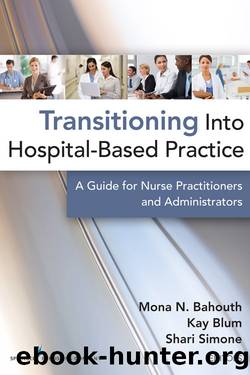Transitioning into Hospital Based Practice by Bahouth Mona N.;Blum Kay;Simone Shari;

Author:Bahouth, Mona N.;Blum, Kay;Simone, Shari;
Language: eng
Format: epub
Tags: Transitioning Into Hospital-Based Practice
Publisher: Springer Publishing Company, Incorporated
Published: 2012-11-03T00:00:00+00:00
Performance Expectations
Minimum expectations for NP performance are defined by the scope of practice specifications, regulatory requirements, and the individual organizationâs job description for the particular role. In addition, professional organization standards specify clinical and professional performance expectations. Performance review is a process that evaluates the job-specific expectations, clinical practice, professional development, leadership responsibilities, and organizational competencies performed by the NP. This formal review of role performance should go beyond evaluation of specific competencies and ideally also evaluate the impact of the role on clinical quality indicators, and on the efficiency and effectiveness of system processes.
The annual performance review process includes methods that reflect a 360-degree evaluation of role performance. The process begins with a peer review system whereby the NP is evaluated by clinical and administrative team members and peers (Briggs, Heath, & Kelly, 2005). This feedback is an essential component for confirmation of practice according to standards. Again, self-assessment is an important part of the evaluation process as it provides information to identify differences in NP expectations about role performance and actual role performance. A sample tool that could be used as a peer review or self-assessment form is presented in Appendix D. Documentation of continued clinical competence, practice according to standards, and organizational expectations and professional contributions is incorporated into the assessment process.
The annual performance review is a time to acknowledge the practitionerâs achievements over the previous year and establish goals to guide the next yearâs activities. This discussion involves transforming identified goals into measurable objectives, creating an action plan, and learning strategies to achieve goals, and establishing a time frame for achievement. Consensus between the NP and the supervisor regarding performance goals and projected achievement is documented and used for monitoring improvement or sustained high performance. Performance evaluation should ideally be an ongoing process with several self-assessments and formal assessments of performance and of achievement of individual and organizational goals throughout the year. Human resources (HR) departments can often be a good resource as you begin examining your evaluation process and tools; they can offer helpful advice in order to gain the most from this experience. Recent regulatory requirements related to provider evaluation have made this process a reality.
The Joint Commission, in 2010, mandated the use of on-going professional practice evaluation (OPPE) and focused professional practice evaluation (FPPE) for physicians and advanced practice providers. These reviews were created to provide a mechanism for organizations to evaluate practitionerâs performance at specific intervals to determine whether the practitioner meets quality standards and if existing privileges should be maintained, revised, or revoked prior to or at the time of renewal. The OPPE process is conducted at a minimum of 6 month intervals, including but not limited to the annual evaluation, and during the recredentialing review process. The FPPE process is conducted for all new hires, typically at the end of the orientation or probation period, when the NP is seeking new skills and expanding privileges, and when an event occurs that raises concern regarding the practitionerâs ability to provide safe, quality care.
Download
This site does not store any files on its server. We only index and link to content provided by other sites. Please contact the content providers to delete copyright contents if any and email us, we'll remove relevant links or contents immediately.
Human Diseases (MindTap Course List) (by Team-IRA) by Marianne Neighbors Ruth Tannehill-Jones(758)
The Neglected Dimension of Global Security: A Framework to Counter Infectious Disease Crises by National Academy of Medicine Secretariat(398)
Statistical Methods in Health Disparity Research by J. Sunil Rao(383)
Imaging in Urology by Mitchell Tublin MD Joel B Nelson MD(371)
Short Course in Medical Terminology by Nath Judi L.;(308)
Clinical Research in Occupational Therapy, Sixth Edition by Martin Rice;(282)
Wilkins' Clinical Practice of the Dental Hygienist by Boyd Linda D.;Mallonee Lisa F.; & Lisa F. Mallonee(277)
Anatomical Kinesiology by Gross Michael;(260)
Murray's Basic Medical Microbiology E-Book by Murray Patrick R.;(258)
Psychedelics As Psychiatric Medications by Nutt David;Castle David;(251)
Neuroscience Fundamentals for Rehabilitation by Lundy-Ekman Laurie(245)
The Handbook of Medicinal Chemistry by Simon E Ward;Andrew Davis;(228)
Public Health and Society: Current Issues by Burke Lillian D.;Weill Barbara;(222)
Rang & Dale's Pharmacology 9th Edition plus Flashcards 2nd Edition by Unknown(220)
Cancer Cell Culture by Unknown(219)
Brown's Evidence-Based Nursing: the Research-Practice Connection by Nowak Emily W.;Colsch Renee; & Renee Colsch(216)
Primary Care Occupational Therapy by Unknown(215)
From Good Schools to Great Schools by Susan P. Gray & William A. Streshly(211)
The Politics of Reproduction in Ottoman Society, 1838â1900 by Gülhan Balsoy(210)
